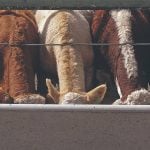The three exported slaughter cattle that led U.S. officials to put new limits last month on breeding cattle from British Columbia may not have had brucellosis in the first place.
The Canadian Food Inspection Agency said Wednesday it has removed quarantines from the two B.C. farms where the three animals lived, after CFIA’s own investigation “did not confirm the presence of brucellosis.”
The U.S. Department of Agriculture on May 28 put temporary import restrictions on “all sexually intact” cattle and bison that have lived in B.C. since March 25, after the three animals tested as “reactors” to the disease during routine slaughter testing south of the border.
Read Also

Ample supplies and improved livestock sector to boost Canadian feed sector: FCC
Abundant feed grain supplies and improved profitability for the livestock sector should support strong feed demand and sales through the winter, says a new report from Farm Credit Canada.
Animals in that category must now test negative for brucellosis, with certification by the CFIA, before export to the U.S.
The USDA’s requirement, which still stands as of Wednesday, does not apply to steers, spayed heifers or bison exported for immediate slaughter.
However, CFIA said Wednesday, animals on both B.C. farms have since been tested for brucellosis, “all with negative results.”
“False-positive”
CFIA also further analysed USDA’s original samples from the three cattle using “more specific” tests at its World Organization for Animal Health (OIE) reference laboratory in Ottawa.
CFIA said Wednesday that the original suspicious test reactions observed in the U.S. lab “appear to have been caused by another bacterium that is known to create false-positive test results.”
CFIA said it has shared the results of its Ottawa lab’s analyses and investigation with the USDA and is “working closely” with USDA officials to see that the border restrictions are lifted as quickly as possible.
Canada hasn’t had a case of brucellosis in cattle since 1989. As of March 1, all U.S. states were classified as free of the disease; Idaho confirmed infection in one herd in late 2009 but has kept its brucellosis-free classification.
Brucellosis is contagious and can affect many species of mammals, including cattle, swine, bison, elk, deer, goats, sheep and horses. It can cause a disease called “undulant fever” in people, but human cases are rare in Canada, CFIA said.
Sanitary practices in slaughterhouses and pasteurization of milk prevent nearly all human cases of brucellosis, CFIA said. People can further avoid infection by avoiding unpasteurized milk or cheese and by careful handling of infected animals and their tissues.
In unvaccinated cattle herds, contagious strains of brucellosis can spread quickly and cause abortions in infected cows. Infections in cows can also lead to stillborn or weak calves, retained placentas and/or reduced milk yield.
For lack of treatment options, controlling brucellosis in cattle depends mostly on detecting and preventing the disease, through vaccinations and by testing and culling “reactor” animals.














